PRESS RELEASE
Background
Local communities continue to experience the power of digital connectivity. As a result, freedom to access and share information has greatly been enhanced. However, concerns abound around potentially harmful content propelled by emerging technologies such as hate speech, disinformation and misinformation are not new. Social media platforms and governments have employed content moderation practices and laws respectively in an effort to regulate vast amounts of content generated online and in compliance with set out international human rights standards. It is noteworthy that UNESCO has recently published the Guidelines for Digital Platforms[1] and it is leading global engagements on the Draft Code of Ethics for the Information Society[2] which addresses the freedom of expression challenges posed by content moderation.
Communication and Technology innovations as well as systems are moving forward rapidly so much so that persons with disabilities are being excluded from the whole digital era evolution due to the lack of integration of assistive technology. At the same time, it is alarming that persons with disabilities risk being excluded by new information communication technologies. Assistive technologies, ICTs accessibility standards and inclusion of persons with disabilities in the digital world are some of the issues being overlooked despite having the relevant legislative frameworks that ensure and promote a barrier-free technological environment thus exacerbating the digital divide. Kenya ratified the Protocol to the African Charter on Human and Peoples Rights on the Rights of Persons with Disabilities in Africa[3] and became the first country in Africa to enact ICT Accessibility Standards.[4] But the fight for inclusive technologies should not stop there. Opportunities exist for more advocacy for disability mainstreaming in technology innovation[5] especially now that digitalization is taking root in critical government service delivery.
Call to action
In order to reap the digital dividends and other internet’s limitless possibilities, local communities should be empowered to identify and tackle potentially harmful content. At the same time, digital technologies must be designed with persons with disabilities in mind. Recognizing the potential dangers of online hate speech and disinformation, UNESCO and ARTICLE 19, launched the Social Media 4 Peace. This EU-funded initiative targets post-conflict countries to build resilience against potentially harmful online content. The project focuses on promoting peace through digital technologies, particularly social media, by establishing multistakeholder coalitions. In Kenya, the National Coalition on Freedom of Expression and Content Moderation (hereinafter “FeCoMo) was established to bring together tech stakeholders, academia, government, think tanks and civil society organizations to foster collaboration in addressing online harmful content, particularly disinformation and hate speech while safeguarding freedom of expression.
However, there exist knowledge gaps at FeCoMo. Therefore, ARTICLE 19 Eastern Africa and the National Council for Persons with Disabilities with the support of UNESCO will be holding a 2-and-a-half-day workshop on Disability Mainstreaming, Content Moderation and Freedom of Expression. Following the training, participants will be empowered to;
- Strengthen the capacities of FeCoMo members with appropriate skills and knowledge to ensure the application of the basic principles of disability mainstreaming in exercising their duties.
- Actively participate in the development of strategies, policies, activities, and advocacy campaigns aimed towards content moderation in relation to Disability.
- Advocate for a human right-centered approach to content moderation,
- Understand the roles and human rights responsibilities of social media companies, to uphold freedom of expression while mitigating the spread of harmful content and ensure adherence to international human rights standards.
[1] https://unesdoc.unesco.org/ark:/48223/pf0000387339
[2] https://unesdoc.unesco.org/ark:/48223/pf0000187196
[3] https://www.socialprotection.go.ke/dsd-achievements
[4] https://dig.watch/updates/accessibility-for-ict-products-and-services-for-persons-with-disabilities-standard-launched-in-kenya
[5] https://thedocs.worldbank.org/en/doc/123481461249337484-0050022016/original/WDR16BPBridgingtheDisabilityDividethroughDigitalTechnologyRAJA.pdf
 Afrikaans
Afrikaans Shqip
Shqip አማርኛ
አማርኛ العربية
العربية Հայերեն
Հայերեն Azərbaycan dili
Azərbaycan dili Euskara
Euskara Беларуская мова
Беларуская мова বাংলা
বাংলা Bosanski
Bosanski Български
Български Català
Català Cebuano
Cebuano Chichewa
Chichewa 简体中文
简体中文 繁體中文
繁體中文 Corsu
Corsu Hrvatski
Hrvatski Čeština
Čeština Dansk
Dansk Nederlands
Nederlands English
English Esperanto
Esperanto Eesti
Eesti Filipino
Filipino Suomi
Suomi Français
Français Frysk
Frysk Galego
Galego ქართული
ქართული Deutsch
Deutsch Ελληνικά
Ελληνικά ગુજરાતી
ગુજરાતી Kreyol ayisyen
Kreyol ayisyen Harshen Hausa
Harshen Hausa Ōlelo Hawaiʻi
Ōlelo Hawaiʻi עִבְרִית
עִבְרִית हिन्दी
हिन्दी Hmong
Hmong Magyar
Magyar Íslenska
Íslenska Igbo
Igbo Bahasa Indonesia
Bahasa Indonesia Gaeilge
Gaeilge Italiano
Italiano 日本語
日本語 Basa Jawa
Basa Jawa ಕನ್ನಡ
ಕನ್ನಡ Қазақ тілі
Қазақ тілі ភាសាខ្មែរ
ភាសាខ្មែរ 한국어
한국어 كوردی
كوردی Кыргызча
Кыргызча ພາສາລາວ
ພາສາລາວ Latin
Latin Latviešu valoda
Latviešu valoda Lietuvių kalba
Lietuvių kalba Lëtzebuergesch
Lëtzebuergesch Македонски јазик
Македонски јазик Malagasy
Malagasy Bahasa Melayu
Bahasa Melayu മലയാളം
മലയാളം Maltese
Maltese Te Reo Māori
Te Reo Māori मराठी
मराठी Монгол
Монгол ဗမာစာ
ဗမာစာ नेपाली
नेपाली Norsk bokmål
Norsk bokmål پښتو
پښتو فارسی
فارسی Polski
Polski Português
Português ਪੰਜਾਬੀ
ਪੰਜਾਬੀ Română
Română Русский
Русский Samoan
Samoan Gàidhlig
Gàidhlig Српски језик
Српски језик Sesotho
Sesotho Shona
Shona سنڌي
سنڌي සිංහල
සිංහල Slovenčina
Slovenčina Slovenščina
Slovenščina Afsoomaali
Afsoomaali Español
Español Basa Sunda
Basa Sunda Kiswahili
Kiswahili Svenska
Svenska Тоҷикӣ
Тоҷикӣ தமிழ்
தமிழ் తెలుగు
తెలుగు ไทย
ไทย Türkçe
Türkçe Українська
Українська اردو
اردو O‘zbekcha
O‘zbekcha Tiếng Việt
Tiếng Việt Cymraeg
Cymraeg isiXhosa
isiXhosa יידיש
יידיש Yorùbá
Yorùbá Zulu
Zulu


